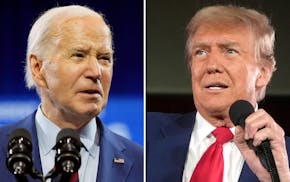WASHINGTON - Sen. Al Franken offered an early glimpse of the Senate hearings on Supreme Court nominee Elena Kagan in a recent speech before the American Constitutional Society.
Kagan's name didn't come up once.
Instead, the Minnesota Democrat used the occasion to unleash a broadside on what he sees as the conservative slant of the nation's high court under Chief Justice John Roberts, whose pro-business rulings, Franken said, "consistently and intentionally protected and promoted the interests of the powerful over those of individual Americans."
The attack line, which he expects to reprise Wednesday when he and Sen. Amy Klobuchar, also D-Minn., get their first chance to question Kagan in public, reflects a broader election-year debate both parties are waging about the ideological direction of the court.
"She's the occasion for a broader symbolic political debate," said Hamline University political scientist David Schultz. "It would be surprising if a congressional hearing, a confirmation hearing in particular, didn't have a political subtext."
With Kagan's confirmation all but assured, and substantive answers about case law considered largely out of bounds, Kagan can do little but duck the crossfire. "It's a big yawn for a lot of people, because the conclusion is clear," said University of Richmond Law School Prof. Carl Tobias, a longtime court watcher.
Meanwhile, Tobias said, "Republicans and Democrats have legitimate issues about the direction of the court."
For Franken, as for other Democrats and liberal interest groups, the larger strategy has been to anticipate Republican attacks on President Obama's solicitor general as a liberal activist who might try to bend the law to her own social views.
In their opening salvos on Kagan, Republicans focused on her praise for the late Justice Thurgood Marshall, for whom she clerked early in her career. Marshall, the first black to serve on the Supreme Court and lead attorney in the landmark Brown vs. Board of Education school desegregation case, has become a GOP talking point on "judicial activism."
The famous Marshall quote several Republicans have seized on: "Do what you think is right and let the law catch up."
Franken, who is emerging as one of the most aggressive Democrats on the judiciary committee, is seeking to turn that debate on its head with his own talking points about "conservative judicial activism."
Hence his focus on the Roberts Court and its Citizens United decision this year, which overturned congressionally-mandated restrictions on election spending by unions and corporations. Franken characterized the decision as the latest in a string of 5-4 votes that erode individual rights in favor of corporations.
In response, Republicans on the judiciary committee released a statement noting that the Citizens United case was decided on free speech grounds, with the public backing of the American Civil Liberties Union.
With little in Kagan's legal biography to attack -- she was never a judge -- Republicans have focused on the politics of the court, painting Kagan as a partisan who would try to move the court left.
The GOP also has questioned Kagan's lack of judicial experience, a point that Klobuchar addressed with an opening statement focused on the former Harvard Law School dean's background as "as a manager, as a teacher, as an adviser, as a consensus-builder, and as a lawyer."
A former Hennepin County Attorney, Klobuchar will likely be one of the few panel members to focus on Kagan's life story and fitness for the Court, an issue that Democrats emphasized more in last year's confirmation hearings of Justice Sonia Sotomayor, a daughter of immigrants.
But Kagan's qualifications to be a Supreme Court justice have tended to fade into the larger ideological battle, such as her role in the debate over gays and military recruiters at Harvard.
The result, Tobias said, "is there's less of a focus on her."
Like Sotomayor, Obama's first Supreme Court nominee, Kagan is widely viewed as sharing the philosophical perspective of the justice she would replace, John Paul Stevens, who is retiring.
But analysts say that even if she doesn't change the ideological balance of the court, the battle over Kagan's confirmation underscores what's really at stake: moving the political debate in the fall's midterm elections and beyond.
Franken, in opening remarks that referenced Roberts more than Kagan, made the connection with voters back home explicit: "I want to say one thing to the Minnesotans watching at home," he said. "With few exceptions, whether you're a worker, a pensioner, a small business owner, a woman, a voter, or a person who drinks water, your rights are harder to defend today than they were five years ago."
Kevin Diaz is a correspondent in the Star Tribune Washington Bureau.

Trump says Biden is running a 'Gestapo' administration. It's his latest reference to Nazi Germany

Denial and uncertainty are looming over a Biden-Trump rematch 6 months out from Election Day

Hush money, catch and kill and more: A guide to unique terms used at Trump's New York criminal trial
What a judge's gag order on Trump means in his hush money case

